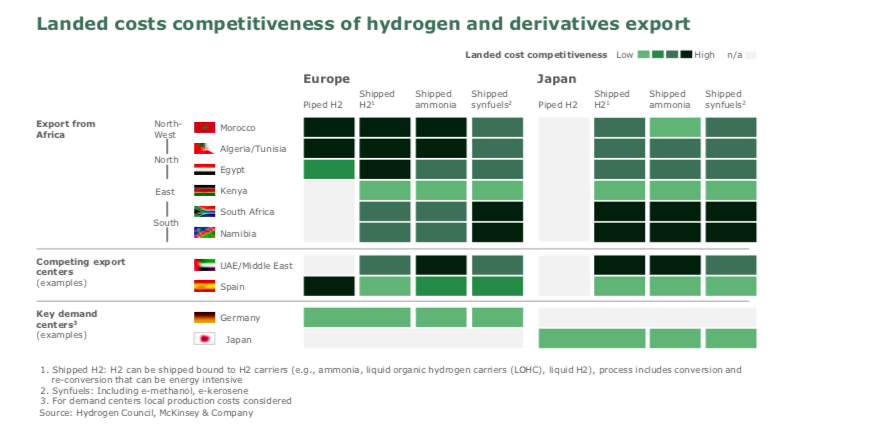Masdar and McKinsey & Company said in a newly published report that Africa could capture as much as 10% of global demand for green hydrogen by 2050. The continent could use its “plentiful solar and wind resources” to produce 30 million to 60 million tonnes per annum (mtpa) of green hydrogen by the midway point of the century, they said. It could also become the world's most competitive source of green hydrogen by 2030, with estimated costs of $1.80/kg to $2.60/kg, but falling to $1.20/kg to 1.60/kg by 2050. They said $320 billion to $610 billion of investment will go to renewables needed to produce hydrogen, while $115 billion to $220 billion will be needed for electrolysis plants. Masdar and McKinsey said most of the capital needed for export projects would come from foreign investors.
Ben-Gurion University researchers and Israel Institute of Technology scientists have revealed new ways to speed up the catalytic process in water splitting, aided by solar energy. Oxygen evolution requires the transfer of four electrons to create one oxygen molecule (O2) and two hydrogen molecules (H2). According to the current paradigm, those electrons move one after the other in a sequence of four steps on an atomic reaction site, which makes the chemical reaction energetically difficult. The researchers said that two electrons can be simultaneously transferred at different reaction sites, reducing the energy barriers for oxygen evolution. “The prevalence of parallel pathways fundamentally broadens the current paradigm of the water photo-oxidation reaction mechanism,” the said in a recently published study in Energy & Environmental Science. “It may inspire new strategies to reduce the high overpotential of this reaction so as to enhance the efficiency of solar fuel production.”
Pertamina Power Indonesia, Keppel Infrastructure, and Chevron have signed an agreement to jointly explore the development of green hydrogen and green ammonia projects in Sumatra, Indonesia. They are considering green hydrogen facilities with production capacities of at least 40,000 tons per annum, powered by 250 MW to 400 MW of geothermal energy in the initial phase. The hydrogen production facility could have the potential to scale up to 80,000 tons to 160,000 tons per year, “depending on the availability of geothermal energy as well as market demands,” said Singapore-based Keppel Infrastructure.
Asahi Kasei has started building an alkaline water electrolysis pilot test plant for hydrogen production at its site in Kawasaki, Japan. It said it aims to start operations in early 2024. The system features a changeable configuration with one to four 0.8 MW water electrolysis modules.
Popular content
Oman and the Netherlands have agreed to cooperate on hydrogen under a letter of intent signed on the sidelines of COP27. “The declaration of intent is a concrete starting point for cooperation between the Port of Rotterdam and the Port of Sohar,” the Dutch government said in a statement. “Through these ports, the Netherlands can start importing green hydrogen from Oman.”
H2Pro and Gaia Energy have agreed to build a pilot green hydrogen project in Morocco, in addition to studying the feasibility of an electrolyzer “gigafactory” in the African country. The agreement is not Gaia Energy's first such deal with Israeli companies, as it signed an agreement with Gander earlier this year to collaborate on renewable energy projects.
ReNu Energy has announced the signing of a term sheet with HESTA, an Australian industry superannuation fund, to invest up to AUD 100 million ($66.8 million) in green hydrogen projects. ReNu Energy said the term sheet is a “non-binding, strategic framework” that will eventually be “converted into definitive arrangements, subject to HESTA completing its due diligence.”
This content is protected by copyright and may not be reused. If you want to cooperate with us and would like to reuse some of our content, please contact: editors@pv-magazine.com.


1 comment
By submitting this form you agree to pv magazine using your data for the purposes of publishing your comment.
Your personal data will only be disclosed or otherwise transmitted to third parties for the purposes of spam filtering or if this is necessary for technical maintenance of the website. Any other transfer to third parties will not take place unless this is justified on the basis of applicable data protection regulations or if pv magazine is legally obliged to do so.
You may revoke this consent at any time with effect for the future, in which case your personal data will be deleted immediately. Otherwise, your data will be deleted if pv magazine has processed your request or the purpose of data storage is fulfilled.
Further information on data privacy can be found in our Data Protection Policy.